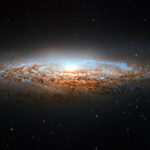What if We Lived in a Simulated Universe and Worshiped a Pimply Teenager?
by Dr. Stacy Trasancos
Filed under Cosmology, The Existence of God
Because the audience at Strange Notions is a combination of Catholics and atheists, I thought the comments in this interview between Brian Greene and Richard Dawkins would be a fun change of pace for a discussion.
Here's a summary of the interview. Dr. Nick Bostrom, a philsopher at the University of Oxford, proposed an argument that in the future we will have powerful supercomputers that can create universes 'in silico.' In these simulated universes, sentient beings will exist unaware they are in a simulation (think Matrix). Bostrom predicts that once humanity has the technology to create simulated universes, there will be more simulated universes than real universes because real universes are harder to create than computer universes. Therefore, in totality there are more simulated universes than real universes. "You come home at night. You flick it on. You create a universe, and sort of kick back and watch it happen."
Bostrom argues that based on statistics it's most likely we already do live in a simulated universe. According to both Bostrom and Greene, people find this the most compelling argument for the existence of a Creator. Why? Because it cannot be disproven and because this idea renders the Creator not some mysterious being but rather a human being. Greene envisions him as "some futuristic teenage kid with pimples in his garage who just created the universe."
In the interview, Greene wants to know what Dawkins thinks of that. Dawkins agrees, "I can't see how you could refute it; I can't see how you could actually be sure we're not." Dawkins also says that if a religion rose up in this simulated universe created by the pimply teenager and he were one of the sentient beings living in the universe, he would not worship the kid. Greene is impressed that there's actually a "logical sequence of words" that gives meaning to the argument there is a Creator of the universe. Dawkins is intrigued. He notes there also has to be a physics built into this simulated universe for it to operate, but that the "pimply youth" could also violate these physical laws during the simulation and suddenly make things happen, at will, that weren't supposed to happen. Here Dawkins seems to get confused.
"Um, it's got to be a pretty disciplined pimply youth that sees to it..." says Dawkins.
"...as a Creator of this world should be..." interjects Greene.
"Yeah, I would say, yes, but that...that we don't, we don't see that, well I suppose we don't, I mean maybe, maybe..."
Correct me if I'm wrong, but it seems that Dawkins, Greene, and Bostrom also find this argument for the existence of a god compelling. I am surprised this is the argument they cannot refuse. I am also surprised Dawkins started to say we don't see discipline in the physical laws of our universe. The scientific method depends on predictability.
My purpose, however, is not to deride or ridicule atheists who ponder our origins. We have that in common. These atheist scientists are bearing witness to the "permanence and universality of the question of origins." This inquiry, the Catechism of the Catholic Church says, is distinctively human. And while the Pimply Teenager God of a Simulated Universe idea is just about as wildly mythical as the ancient religions who produced creation myths, it no less represents a search for explanation of some sort. It is at least less violent than the Babylonian creation myth whereby the mother goddess Tiamat spawned monster-serpents as children who revolted against her, planned evil, and dismembered her to form the world as they burst her belly and smashed her skull until she was angered like one possessed and lost her reason. Truly, that would be a world in which you could doubt the discipline of the Creator (or creator-monster-children-serpent-things).
Nonetheless, the Christian faith has always challenged arguments to our origins that are different from its own.
It rejects a Gnostic god, for instance, who would will people to shun the universe as evil while clinging to the spiritual realm. The Christian view is not based on blind faith, nor does it ask Christians to reject the material realm.
Christianity rejects a Deist god who would create the universe and leave it to run like a machine until he felt like tricking people by breaking the laws of physics, just as the Pimply Teenager god. Christians do not believe that God is a puppeteer determining every behavior and action in disconnected instances in time, creating scenarios as he goes. Such strict fideism assumes we cannot know with any certainty what the guiding hand will do next. This view denies that beings have intrinsic natures influencing their behavior, but the view is unbalanced; it over-emphasizes the freedom of God but denies his rationality. On the other hand, the Christian worldview is not strictly deterministic either, as if God created the world like he built a clock, wound it up, and ignored it to tick away time. That view is also unbalanced; it over-emphasizes the rationality of God but denies his freedom.
It is worth noting there could be no science in either of these scenarios, or in the Gnostic worldview. On this, I think we all can agree: Strict gnosticism, fideism, and determinism are inimical to science. The first denies the significance of physics, the second denies the predictability of physics, and the third denies the need for experimentation, for in a strictly determined world we would be able to deduce the entire physical system by pure thought. The Christian God demonstrates a fine line between rationality and freedom, a fine line we strive to emulate in our human endeavors.
Christianity also rejects a Pantheistic god, who would emanate the universe from himself or be one with the universe as the universe is created and destroyed in eternal cycles of good and evil. While this might make for some interesting simulations for the post-human basement dweller, it is not so good for us humans having a discussion right now. If the universe emanates from God and runs on an eternal cosmic ferris wheel, with all of us caught hopelessly in whatever part of the cycle we happen to have been born on, how could we have any desire for innovation or escape? We are either despairing at the bottom of the cycle or complacently soaring at the top, and we cannot have the motivation or the confidence to learn and dominate the physical laws of nature.
Finally, a Materialistic god could not exist, for it presents an internal contradiction. The word "god" typically refers to a supernatural being, or being itself, but a materialistic god would be within the natural world.
But a Pimply Teenage god of a simulated universe? I guess I'm wondering why atheist scientists think his existence is compelling enough not to refute, and how an atheist would describe this god should he be the atheist ideal.
With the exception of Materialism, anyone who holds these beliefs about the universe's origin could, as Greene did, claim they are a "logical sequence of words" giving meaning to the argument that there is a Creator of the universe. The Christian view of origins, however, is not just a logical sequence of words; it is reasoned from divine revelation. The Christian assumes the universe and our existence is real, that it is not simulated. The Christian God is not only monotheistic, but Trinitarian and Incarnational. I'm sure Catholics here can explain more about these dogmas if anyone wants to know more, but the key word is "wants". Faith cannot be imposed.
So yes, I suppose if we follow the line of thought from Greene, Bostrom, and Dawkins and ponder a post-human society someday when there will be a way to simulate universes, then yes, I suppose one could say, in the utmost simplistic of statistical statements, that there would be more simulated universes created with the flip of a switch than the one real universe. But that line of logic only begs the question, "Who created the computer and the computer god, and why did he have to flip a switch?"
Yet in the end, I think all of us, Catholics and atheists alike, can agree with Dawkins and Greene here—such a flippant clientele of supercomputer gods would not be worthy of our worship.
Related Posts
Note: Our goal is to cultivate serious and respectful dialogue. While it's OK to disagree—even encouraged!—any snarky, offensive, or off-topic comments will be deleted. Before commenting please read the Commenting Rules and Tips. If you're having trouble commenting, read the Commenting Instructions.













